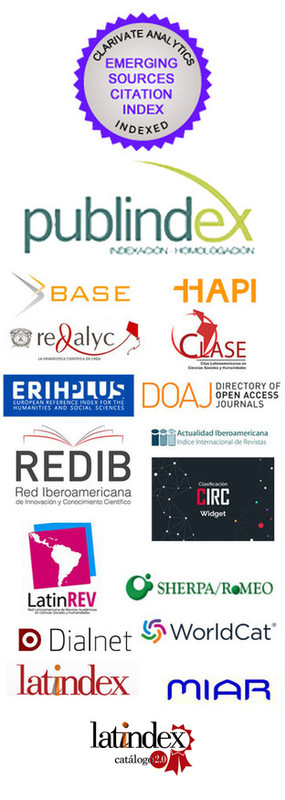About the Journal
Focus and Scope
CALLE14 is a means of circulating knowledge and knowledge produced by academic communities specialized in the field of art, which, due to its mediating action, facilitates the construction of disciplinary and interdisciplinary artistic communities, networks of researchers in the national and international international and, above all, tends to the social appropriation of knowledge as an instrument of transformation of subjects and collectivities.
Peer Review Process
All articles will be submitted to an anonymous arbitration process by national or international evaluators who can make suggestions to the author. The comments of the evaluators and those of the Editorial Committee of the journal should be taken into account by the author in order to make the corresponding adjustments. The Editorial Committee defines the publication of the articles approved in the corresponding number. The author of an article can suggest two possible peer evaluators, however, the designation or not of one of them corresponds to the Editorial Committee. The editorial committee reserves the right to introduce the necessary formal modifications to adapt the text to the publication rules.
Open Access Policy
This journal provides immediate free access to its content under the principle of making research available to the public free of charge, which fosters a greater exchange of global knowledge.
Checklist for the preparation of shipments
As part of the submission process, authors are required to verify that their submission meets all the elements shown below. Authors who do not comply with these guidelines will be returned to the authors.
The petition has not been previously published, nor has it been submitted to another journal (or an explanation has been provided in Comments to the editor).
The manuscript is a file compatible with Word, on a letter-sized sheet (21.59 cm x 27.54 cm), with margins of moderate character, in Times New Roman font size 12, single spaced, without separation between paragraphs and aligned to the left.
The article does not exceed 7,000 words in length, including title, subtitle, abstracts, keywords, footnotes, list of references and annexes.
Title, that clearly summarizes the main idea of the investigation.
Type of article (research, reflection, review, etc., according to the list of accepted articles).
The names of the author (s) of the work, are normalized according to their form of citation.
The institutional link of the author (s) includes; mailing address, telephones and emails (for all authors).
It presents acknowledgments and information about the nature of the manuscript.
The summary is brief but comprehensive about the content of the monograph. The summary does not exceed 150 words in English and Spanish.
Keywords, a minimum of three and a maximum of six, arranged alphabetically. In English and Spanish.
Numbered references to graphs, tables, pictures or images.
Titles and feet of graphs, tables, pictures or images.
Complete list of references with compliance with the APA standard.
Conflicts of interest
Editors, authors and reviewers have the responsibility to communicate if there is a conflict of interest regarding a publication when these may affect its ability to objectively review the original.
The Editors of RLyLA ask the reviewers for a statement about the conflicts of interest they may have in the review of the assignments. Editors understand these statements should provide information on (eg, ownership of the patent, ownership of shares, consultancies, fees for conferences), personal financial, political, intellectual or religious interests related to the area of research or discussion.
Precision
The editors of CALLE14 have the responsibility to guarantee the accuracy of the material they publish. CALLE14 encourages authors and readers to notify the Chief Editor of the journal by e-mail, of any error detected in the published work.
Given this fact, the journal will publish in a short time the correction of the error detected, especially if it refers to data that may alter the interpretation of the information presented in an article.
Corrections derived from errors in an article, whether they come from the authors or come from the journal, are not considered a misconduct in the publication.
The academic debate
CALLE14 promotes academic debate through the promotion of communication between authors and readers, and invites authors to answer all queries or clarifications received. However, authors have no right to veto unfavorable comments about their work and may choose not to respond to criticism if they consider it.
Periodicity
The periodicity of the Journal is Semester










